If you are wondering how to say I love you in French, you have come to the right place! The words for love in French are a bit limited, but you can express your feelings with thoughtful gestures and actions. Here are a few of them: Je t’aime aussi, j’aime beaucoup, and Il a chaud, which means it’s hot. For more romantic French expressions, listen to Edith Piaf’s famous love song, La vie en rose!

Je t’aime aussi means “I love you”
To say “I love you” in French, you can use the following two expressions. The first, je t’aime aussi, means “I like you” or “I love you too.” The latter is more specific and is used only to refer to romantic partners. You can also use the same expression to tell someone that you don’t love them anymore. The first two are usually pronounced differently, and the correct translation depends on the context.
When saying “I love you” to someone, make sure to put an article before the noun. It is necessary to use the article before the plural noun, but you can also use “moi aussi, je t’aime” instead. Nevertheless, there are a few things you should know about French love expressions. First, don’t use cliche expressions such as “J’aime le chocolat,” “J’aime le wine,” or “I love the smell of fresh cheese.”
Je t’aime beaucoup means “I like you a lot”
If you’re thinking of saying “I like you a lot” to someone, you should first learn the word for “like.” The French word for “like” is beaucoup. It is an adverb, meaning “a lot.” It’s not meant to indicate how strongly you feel about someone at the moment; instead, it conveys a deep and lasting affection.
The verb tu in English is used when referring to an intimate relationship. You can also say “I like you a lot” if you are describing a friend. However, you should be more specific if you’re referring to a friend. In this case, you can use “je t’aime beaucoup” in French. The opposite is true of “tu” in French.
A second common way to say “I like you a lot” in France is to have a beguin for someone. The phrase “beguin pour tou” originates from a religious order in the 12th century. Les Beguines wore special bonnets called beguins. However, different sources attribute different meanings to this phrase. So, it’s important to learn the origins of the phrase before using it with someone new.
Il a chaud means “it’s hot”
When describing the weather, you can use both the words ‘faire’ and ‘chaud’. The word ‘chaud’ means warm or hot, and is also used to describe the temperature. You should never use the word ‘frigid’ or ‘hot’ for other people, as these words imply that the person is either frigid or horny. Alternatively, you can say that something is hot because it is cold or hot because it is frigid.
Another French expression that means ‘it’s hot’ is ‘il fait.’ This phrase refers to hot weather. It can also refer to cold weather, but “il fait chaud” is a common choice. ‘Faut’ can also be used to refer to nighttime weather. It can also refer to the weather, which can be cold or hot. The French also have several other words for “faut”.
La vie en rose is Edith Piaf’s favorite love song
This classic French chanson describes the wonder of love, with everything turning pink when you’re with your beloved. Written shortly after World War II, the lyrics speak to the beauty of a romantic relationship. Although the main stream media portrays humanity as on the brink of disaster, Piaf’s words are timeless and relevant to the times. La Vie en Rose has been covered by numerous artists, from Louis Armstrong to Lady Gaga.
The words of La Vie en rose are simple, yet poignant, describing the feeling of finding a romantic partner. Piaf became famous for her rendition of this song, which became a classic after the end of World War II. In the 1960s, Piaf wrote another love song, Non, Je Ne Regrette Rien, which was dedicated to the Foreign Legion. The song, “Non, je ne regrette rien,” also tells a similar story, but is written by an alcoholic. Piaf later turned to alcohol and morphine, and ended up ending her life prematurely.


